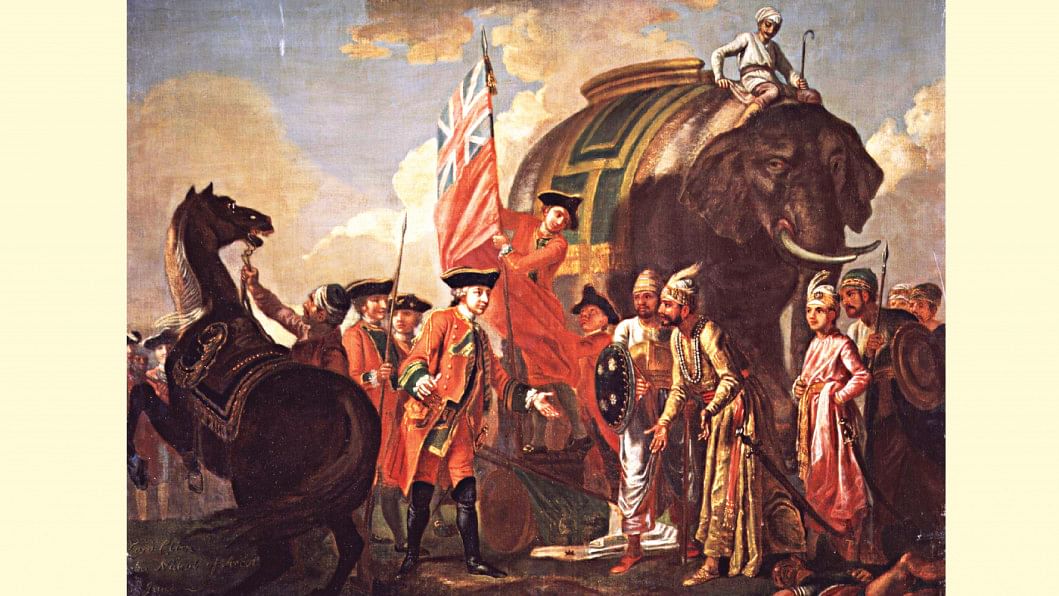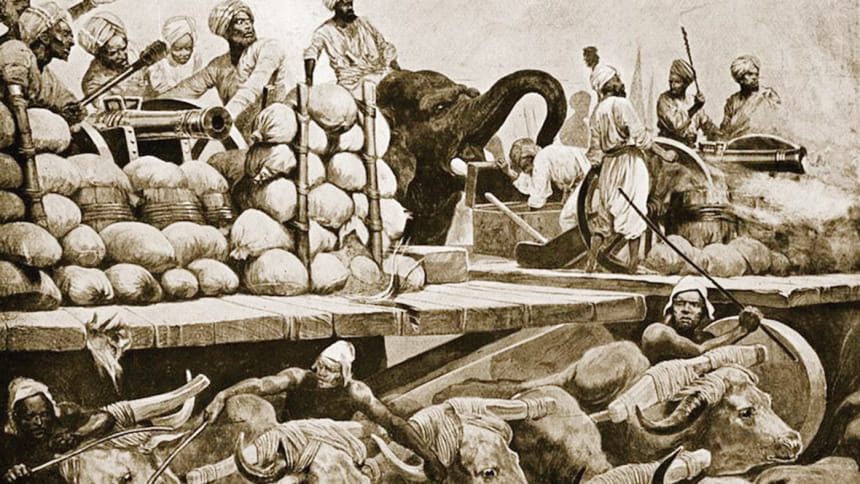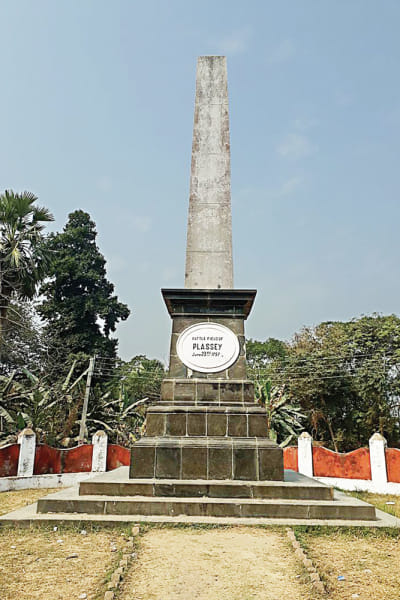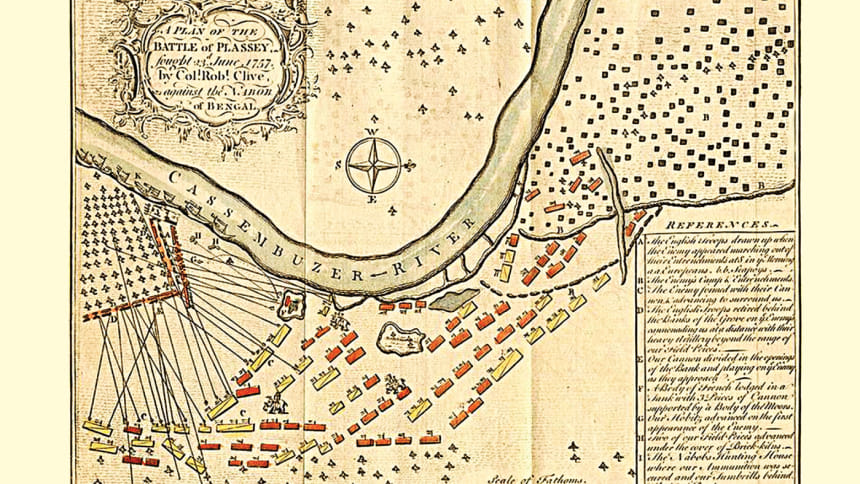THE ROAD TO PLASSEY

This paper argues, contrary to received wisdom, that the Plassey conspiracy leading to the British conquest of Bengal in 1757 was engineered and encouraged by the British who in their project of the revolution roped in an influential section of the Murshidabad darbar. It has been maintained even in the latest studies that the British had no 'calculated plotting' behind the Plassey conspiracy, that it was the internal 'cirisis' both political and economic, which 'inevitably brought in' the British, that it was the Indian conspirators who invited British to help them in deposing the young Nawab Sirjuddaula. It will be shown in this paper with day to day developments from European archives, especially the very British records, how it was the British who were too anxious to bring about the revolution by overthrowing Sirajuddaula. The evidence put forward here will reconstruct how the British tried their best till the last moment before the Battle of Plassey to persuade the disgruntled courtiers of the Nawab to stick to the British 'project' of a revolution.

Thus it is not surprising that even after the finalisation of the conspiracy, the road to Plassey was neither very straight nor an easy one. Anxious as the British were to bring about the coup, it was left to them to co-ordinate and organise the plan, as the Indian conspirators could not be taken for granted. It was Watts, shrewd as he was, who realised the situation quite well and thus observed about the Indian conspirators.
"We can expect no more assistance than that they will stand neutral, and wait the event of a battle. If we were successful they will reap the benefit, if otherwise they will continue as they were without appearing to have been concerned with us."
However, the agreement with Mir Jafar notwithstanding, the Select Committee became extremely anxious to put its plan of revolution into execution. On 11 June it considered and debated whether it would be 'most proper for our army' to march directly towards Murshidabad or wait for further advice and a plan of operations from Mir Jafar. It came to the conclusion that no time should be lost and that the army should directly march for the following reasons.
"The present conjuncture is the most favourable that can offer to carry the project for a revolution in favour of Mir Jaffar into execution, as the secret by delaying the execuation may be discovered and our whole scheme of course overset by his being cut off, in which case we shall be exposed to the Nabob's resentment and left to act singly against the united force of the country."
In fact, Watts was urging Clive and Select Committee to march soon after the conclusion of the agreement with Mir Jaffar. Before he fled from Murshidabad on 12 June, he again advised Clive to march immediately as 'the least delay would ruin our affair. Meanwhile a serious complication cropped up. Mir Jafar was dismissed from the office of bakshi by the Nawab around 9 June which led to such a crisis in the relations between the Nawab and Mir Jafar that, according to Scrafton, was likely to 'have blasted all our hopes'. Mir Jafar thought himself to be in such danger that he didn't venture to go to the court, being afraid of an attempt on his life. He informed Clive about the situation he was in, adding that nothing but Clive's march could extricate him from the danger.

The Nawab vacillated and failed to taken a firm stand against Mir Jafar. His faithful friends tried to convince him that it was at Mir Jafar's instance that the British intended to march towards Murshidabad and advised him to fall on Mir Jafar immediately. But others in the court who were in league with Mir Jafar persuaded Sirajuddaula to make up the breach for the present and defer his designs to some more favourable occasion. And thus followed reconciliation between Siraj and Mir Jafar. Both swore on the Koran- the Nawab that he would never attempt on the latter's life and Mir Jafar that he would be the Nawab's faithful soldier and fight for him to the last drop of his blood. Jean Law reflected that any man but Sirajuddaula would have found means of arresting and imprisoning Mir Jafar, Roy Durlabh Ram and the Seths. He opined that if this blow was struck, it was probable the British would not have dared advance towards Murshidabad.
The patching up between Sirajuddaula and Mir Jafar made the latter a suspect in the eyes of the British. Watts wrote that though Mir Jafar was again joined with the Nawab but without any real reconciliation on either part, this was sufficient to raise a doubt, how far 'any dependence could be formed upon his acting, and what followed, plainly showed that was not ill-founded'. But by now the British were all set to wage war on Sirajuddaula. Before he began his march towards Murshidabad, Clive wrote to Shaikh Amirullah, the faujdar of Hughli, on 11 June that he was marching to the capital in order to see that the articles of the treaty were complied with. Amirullah wrote back to Clive the next day:
'While I was near the Nabob I saw nothing what bespoke the most friendly intention towards the English, and earnest desire to finish the treaty with the English, and it is only the great importance of the affairs that has occasioned the delay. It is not proper that on the misrepresentation of bad men you should take such an immediate resolution to march to Muxadabad'.
But the British had to find an excuse to execute their project of a revolution. So Clive wrote to the Nawab on 13 June that he was marching towards Murshidabad as the latter had not been true to the treaty, that in corresponding with Bussy he violated what he agreed earlier that 'your enemies should be mine and mine yours" and that he intended to put the dispute to arbitration before the 'great men' at Murshidabad. But the Nawab on his side maintained consistently from the end of April that he remained unalterably firm to the treaty and that 'there is nor shall be any deviation from if on his side. He also warned the British, time and again, that if they began their march that would be tantamount to the breaking of the treaty by them. After Watts' flight from Murshidabad he wrote to Clive and Watson that this was' an evident mark of deceit and of an intention to break the treaty'.
When Clive began his march he had received nothing but bare promises from Mir Jafar with whom he had even no personal acquaintance. He reached Katwa on 19 June when it fell to the British. He halted there for two days 'in the most uneasy suspense' in order to receive some intelligence and gain certain advice of what might be expected from those 'who were entered into the party with, and engaged to support' Mir Jafar. But when this arrived, it was, as Watts observed, far from being satisfactory or explicit.

As a result Clive was quite nervous. He wrote to the Select Committee on 19 June that he felt 'the greatest anxiety at the little intelligence' he received from Mir Jafar, and that 'if he (Mir Jafar) was not treacherous, his cautiousness from want of strength of the British' would, he feared, overset the expedition. At the same time he informed the Committee that he was trying 'a last effort' to prevail upon Mir Jafar to march out and join the British. He made it clear to the Committee that he would not cross the river unless Mir Jafar joined him, and that if he could only secure 8 or 10,000 maunds of grain he could, with this and what he had secured at Katwa, holds his position until after the rains, when, if necessary, it would be easy to form an alliance with the Marathas or the Raja Birbhum or even Ghaziuddin Khan, the wazir of Delhi.
In other words, the British were intent on deposing Sirajuddaula, even if Mir Jafar and his fellow conspirators failed to help the British, and according to the British plan, this could have been brought about even with the help of others, not necessarily with the assistance of a section of the leading personalities of the Murshidabad Darbar. Even at this point, Clive was not sure about Mir Jafar and that was why he asked the Select Committee to instruct him how he should act in case Mir Jafar 'can give us no assistance'.
Even as late as 21 June, Clive wrote to the Select Committee that he was at a loss how to act at the prevailing situation, especially if he had received a confirmation of Mir Jafar's resolution to 'stand neuter'. He was apprehensive that if the British attacked Nawab's forces, it would be entrenched and the British would be without any assistance. He reiterated the expediency of sending an embassy to Ghaziuddin Khan or the Marathas to invite them in.
Turning to the Nawab's camp, one finds that the situation there was confused. As we have seen, both the British and the French were bribing as many people as they could afford. But Jean Law, chief of the French factory at Kasimbazar, with his limited resources could only buy men whom the British did not particularly want and who, with more money power and with Umichand's assistance, succeeded in penetrating the Murshidabad Darbar more effectively than the French. And after the fall of Chandernagore, Sirajuddaula was completely bewildered. In fact, it destroyed the chances of Franco-Bengali alliance against the British and made the British comparatively free to take bolder steps against the Bengal Nawab. Sirajuddaula outwardly conveyed his 'inexpressible pleasure' at the British victory but all the same time did not desist from giving encouragement to Law at Kasimbazar, or from sending letters to Bussy who was reported to have moved from the Deccan to Cuttack. He sent a jamadar to Law with a hundred musketeers to guard the French factory at Kasimbazar and one of his flags to put over the gates as Law had asked him to do. He also sent Law 'word to fear nothing, that he would support me with all his forces'. The fact of matter appears to be that the Nawab, intimidated by the British and enfeebled by the simmering discontent in his court where he vaguely suspected a conspiracy brewing up, was only half-hearted in his negotiations with the French for an effective alliance against the British.
By now, the conspiracy was publicly talked of. Karam Ali the author of Muzaffarnamah observed that Sirajuddaula, even after informed about the designs of his enemies, 'remained sunk in negligence and enjoyment of pleasure' while his confidants, especially Mir Mardan and Khwaja Abdul Hadi Khan, 'grieved at this slothfulness'. But this was perhaps not quite true. It seems that Sirajuddaula became nervous and confused at the knowledge of the conspiracy and the suspicion of a possible British attack. So he was too scared to alienate completely even those whom he suspected to be involved in the intrigues against him. Perhaps he still hoped that he would be able to put up a united stand against the British if the latter attacked him. And that was the reason why he soon reconciled Mir Jafar and Khadim Hussain Khan, restored them to their former offices and they promised allegiance under oath of fidelity to the nawab.
There is little doubt that Sirajuddaula's greatest mistake was not to take firm action against Mir Jafar and his co-conspirators. As a matter of fact, his loyal commanders suggested such a course of action.
But as the Persian chronicler puts it, some 'traitors' advised him that without assembling a vast army it would be almost impossible to fight the British and hence it was necessary to conciliate Mir Jafar and others. So Sirajuddoula gave up the ideal of punishing his enemies and went for reconciliation.

Law pointed out Sirajuddaula's folly in not firmly dealing with the conspirators. He observed that 'instead of recognising that he had been betrayed, Siraj reconciled himself with Mir Jafar who to hide his perfidy swears on the Koran to be faithful, and at once the Nawab is satisfied'. He was wondering when Sirajuddaula must have known the ill will of Mir Jafar, Jagat Seths and others towards him, 'why then he did not try to anticipate their designs? He himself gave the answer:
'I see no other reason for this illogical behaviour except the isolation in which he found himself by the sickness of Mohan Lai. He did not know in whom to trust, or rather he wished to appear to trust his enemies in the hope of deceiving them, and of getting an advantage by hoodwinking them till the occasion was favourable for breaking out'.
Indeed, Mohanlal's illness, who was suspected to be poisoned by his enemies, was the most crucial factor, which tilted the balance against the Nawab and in favour of the conspirators, including the British. As Yousuf Ali noted, he was like a 'firm pillar' to Sirajuddaula.
By now the conspiracy was reaching fruition and Watts planning his escape from Murshidabad. The flight of Watts on 12 June gave Sirajuddaula the real scare and he was now convinced of the British design. Clive sent his ultimatum on 13 June and the Nawab wrote back to him:
'[Watt's escape] appears to be done with a very deceitful design and intention to break the treaty. For certainly without your orders and directions Mr. Watts would never have acted in this manner. It was the consideration that something of this kind was contriving that hindered me from recalling the army from Plassey for I knew some trick was intended. I thank God, however, the treaty has not been broke on my parť.
Sirajuddaula frantically wrote to Law to come to his aid. There were rumours galore that Bussy was planning to enter Bengal. The possibility of French intervention was still a worry for the British and the last hope for the Nawab. Some of his advisers again put pressure on him to arrest Mir Jafar but yet again, possibly in order to avoid a rift in the army at this critical moment, he tried to conciliate his ambitious commmander. Almost humiliating terms for Sirajuddaula but yet he accepted them in all sincerity only for the sake of a united front against the British but only in vain as Mir Jafar was to betray him only a few days later.
The stage for Plassey was now finally set. The conspiracy was ripe. Watts and Scrafton had done everything possible to ensure its success. The treaty with Mir Jafar was signed, sealed and handed over to the British. The blueprints for treachery had been drawn upon and finalised. Plassey became inevitable and there was no turning back from the road to Plassey.
Professor Sushil Chaudhury was a renowned historian of eighteenth-century Bengal.
This excerpt is taken from the article titled The Road to Plassey, A Reappraisal of the British Conquest of Bengal, 1757 published in the Proceedings of the Indian History Congress in 1998.





Comments